On Tuesday 3 October 2023, Professor Andrew Lees gave his talk on ‘Silent Language’ commemorating the life and work of Macdonald Critchley.
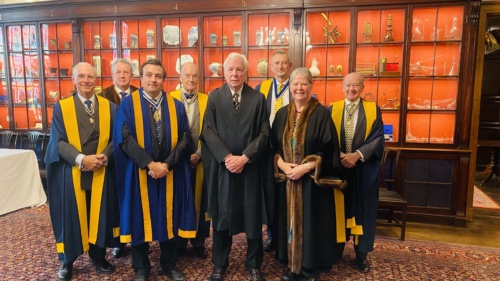
(Left-right) Nicholas Wood, Jonathan Holliday, Dr William Parker (Deputy President)
Dr Roy Palmer (Past Master), Professor Andrew Lees (Speaker), Professor Martin Rossor, Dr Julia Neild & Dr John Moore-Gillon
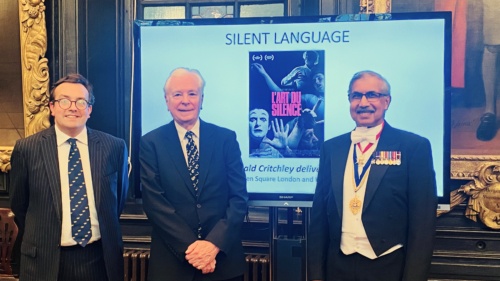
(Left-right) Dr William Parker (Deputy President), Professor Andrew Lees (Speaker) & Aroop Mozumder (Master Apothecary)
If you missed the lecture, it will be available on our Soundcloud platform – click here
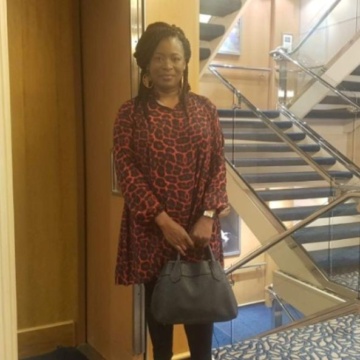
Ome Obodo, prior to taking up this exciting role of Academic Assessment Administrator at Apothecaries Hall, Ome comes from a background with over 15 years of working with one of the largest exam boards, Edexcel Pearson which caters for GCSEs & A levels’ qualifications & exams in the UK as well as vocational courses from BTEC to HNDs qualifications.
Ome looks forward to bringing a wealth of experience in exams to best service the organisation.
AVM Aroop Mozumder
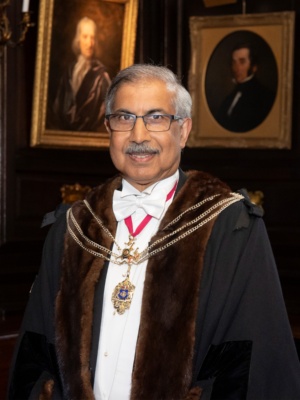
It is an enormous privilege and honour to be elected Master Apothecary for the year 2023-24. I would like to thank my predecessor and friend Dr Jonathan Holliday for his huge contribution last year in moving forward a range of important issues, from implementing the findings of the Academic Review Group to widening access to our Hall for young Apothecaries. In doing this he has had an eye to our history, indeed we much enjoyed celebrating the 350th anniversary of the Chelsea Physic Garden on 31 May 2023.
Academically the Society has been very busy. Maintaining our portfolio of examinations through the difficult COVID years has not been easy, so our thanks go to the Head of Academic and the Dean for their sterling work. Indeed, they have driven progress towards on-line and digital examinations much more in keeping with other postgraduate academic bodies. We are also looking to expand our number of examinations and always strive to remain relevant to current medical practice. I also look forward to working with our new Faculty Presidents and supporting their interesting range of evening lectures.
This year I also look forward to working with the Curator, Past Master Mr Nicholas Wood and his team in broadening the visibility of some of our medical treasures so that they are increasingly seen at major Society functions.
In July and August 2023 we are carrying out a major refurbishment of the Great Hall, Parlour, stairs and the landings. You will all notice the changes, which will be expertly managed by the team that developed the Shop, much more in keeping with some of our historic colours, which is a really exciting development. We expect to have the Hall back and functioning by mid-September.
The past few years have seen many significant changes and we are now in a much better position with our estates, our academic and financial governance, and I would like to give due thanks to the Clerk and his team who are doing the hard work of implementing the changes.
Our social functions are increasingly well attended, which is very pleasing and we are making good use of the Shop and the Courtyard for both formal and informal functions, long may that continue!
I wish you all a very happy and healthy year. Please stay engaged with the Society and do take part in our full programme of interesting lectures and events, and please contribute to the vital charitable role that the Society plays in supporting medical students in need.
With Best Wishes,
AVM Aroop Mozumder, Master Apothecary
For more information on the following;
- Diploma in the History of Medicine,
- Diploma in the Philosophy of Medicine and the
- Diploma in Medicine in Conflict and Catastrophe.
Courses starting from this autumn 2023 and January 2024.
From carboys to COVID vaccination, herbs to herbals, materia medica to medicines, explore the objects and organisations that tell pharmacy histories today. This course will take you behind the scenes of key pharmaceutical collections with curator-led tours, object-based sessions and insightful talks that provide background stories and reflect on the challenges of curating and collecting pharmacy history to present to visitors in the 21st century.
Click here for more information

The Rose Prize 2023 is now open for submissions.
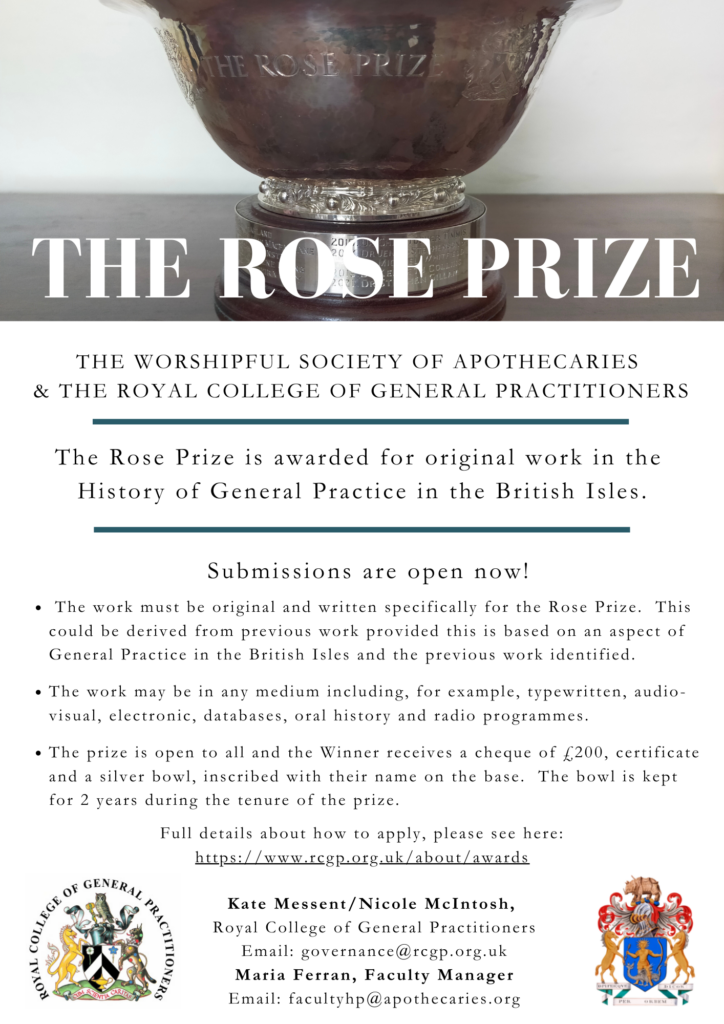
For more information, click here for the criteria.
2021-2022 marked the first time in the history of the Society of Apothecaries that three women are holding Leadership roles.
Marking International Women’s Day, Maria Ferran, Faculty Manager of The History & Philosophy of Medicine & Pharmacy and Karen Okemiri, Faculty Manager, Conflict & Catastrophe Medicine are sitting down with three of the Society’s prominent women, Professor Jane Anderson CBE, Immediate Past Master, Christina Dale, President Conflict and Catastrophe Medicine and Briony Hudson, Immediate Past President, Faculty of the History & Philosophy of Medicine & Pharmacy.
They are sharing how they felt, their aims, and what it is like to juggle many roles.
We hope you enjoy celebrating their journeys with us.
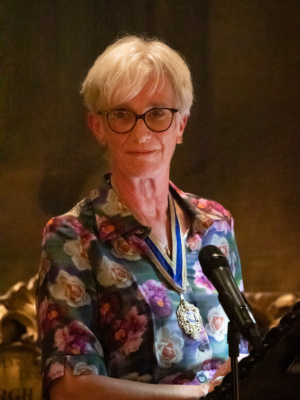
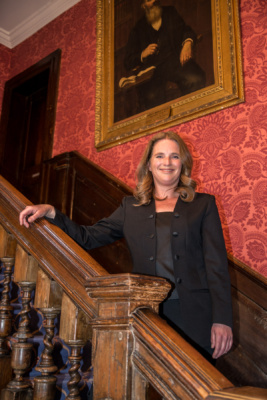
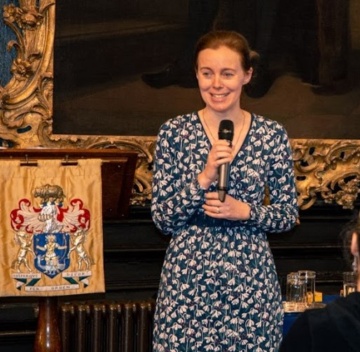
(left-right) – Professor Jane Anderson, Immediate Past Master
Dr Christina Dale, President of Conflict and Catastrophe Medicine
Briony Hudson, Immediate Past President of The History and Philosophy of Medicine and Pharmacy
Maria Ferran, Faculty Manager & Webmaster interviews Briony Hudson for
International Women’s Day 2023
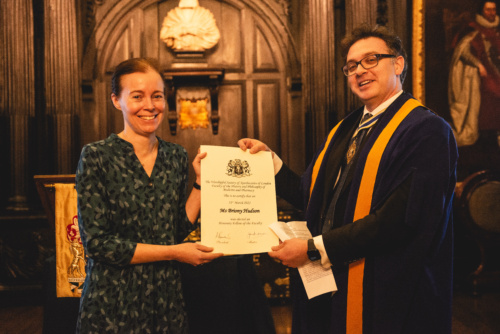 Briony Hudson being awarded her Honorary Fellowship
Briony Hudson being awarded her Honorary Fellowship
to the Faculty by Andrew Papanikitas, President
MF: What did it feel like to be the second female President of the Faculty?
BH: It was a real honour and privilege to have been the President, let alone the second woman to hold the role. Tina Matthews, the first woman President, originally encouraged me to stand for the Committee, and has been a great support and role model in terms of her pragmatic and determined approach to leadership.
It was been fabulous to work alongside Jane and Christina, a unique time in the Society’s history with Jane Carey-Harris leading the Livery Committee then as well. I think Elizabeth Garrett Anderson would approve!
MF: What vision did you have for the Faculty?
BH: I very consciously worked with you as Faculty Manager to ensure that considerations of diversity were more embedded in all of the Faculty’s work – including committee membership, programming and accessibility – which partly inspired my minority position as a non-medic younger woman in a senior Society role. What the Faculty offers could be enjoyed by many and more varied people than we currently reach, so I also had an ongoing mantra about joining the dots in terms of communication and promotion. Finally, as a museum curator and pharmacy historian, I was delighted that the Society’s fantastic collections were much more integrated into Faculty courses and events, and that the “and Pharmacy” part of the Faculty’s name was also more visible in its activities – my main mission when I joined the committee.
MF: How do you juggle the many hats you wore as a freelancer?
BH: With more difficulty than most people see! I’m a meticulous time planner and list maker, and have been incredibly lucky that I’m not our family’s main breadwinner, so can consider my capacity to take on roles (voluntary and paid) and projects alongside my parental and pet-owning responsibilities! Lots of my projects and roles have tessellated over time or built on each other which also makes them both easier and more enjoyable.
MF: Share a piece of advice someone gave you that you have never forgotten?
BH: “Take notice of the small things as they are often actually the big things.” Although I first came across this in the context of listening to your small child’s seemingly trivial concerns so that they will hopefully trust you with their significant worries too, I think this also rings very true for a successful management approach, building relationships – and also for my personal well being.
MF: What now and how can people connect with you?
BH: I started as (part-time) Director of Amersham Museum (www.amershammuseum.org) at the end of July 2022, and am really enjoying getting settled into such a vibrant and friendly local museum. My first book for children – Medicine. A marvellously illustrated history (with illustrator Nick Brown) – was published which was exciting after previous publications aimed at adults.
You can find me on Facebook and Twitter (@brionyhudson2), and occasionally in person at Apothecaries’ Hall!
Karen Okemiri, Faculty Manager interviews Dr Christina Dale
for International Women’s Day 2023
KO: What does it feel like to be the first female President of the Faculty?
CD: I am also the first civilian to take on this role. Most of the time I feel a bit of an imposter! I was very keen to make some changes during my Presidency and was very conscious that I had to ensure that I brought people with me, I don’t always succeed in this but always tried. Although I am conscious of having a very different demographic and background, because I have been on the executive for many years I believe that people saw me as being someone who strongly believed in what we do. I have a very strong vision of what I want to achieve and I am fortunate that people want to support me. I firmly believe it is important for people to see women in leadership roles, I didn’t consider myself taking on this role but was encouraged to do so. I do think that the female trait can lead to us holding ourselves back at times which is why the more we see women in leadership roles, the more “normal” it will be and less of a thing!
KO: What do you wish to achieve for the Faculty?
CD: I want the Faculty to grow and also offer something more for its membership, beyond the course. For many years I had felt it was important that our alumni had a reason to continue their relationship with our Faculty. Our membership had been very stagnant for some years and I believed that we were missing an opportunity to provide our membership a way to connect and receive mentorship from some of our more experienced colleagues. If a healthcare worker is interested in Conflict & Catastrophe Medicine it can be hard to find someone who can help you to work out how to balance your NHS career with deployments. It’s also hard to find opportunities to work for organisations and getting that first “gig”. Many years ago when I was a junior doctor wanting to work in this field, there was a journal “International Health Exchange” which had articles, posted courses and jobs, that had long since gone and I really believed that we could create something similar online for our members. A platform where people could connect, get mentorship, post about courses, books and papers about the subject as well as a place to look up resources. This would help our members to continue their development and connect with members for advice wherever they were in the world. I also want to ensure that we had a bigger pool for future lecturers and executive in order to ensure the sustainability of the Faculty.
KO: What are the ‘highs’ and ‘lows’ of being a Leader?
CD: A real high is getting FCCMConnect up and running and seeing so many of our past students joining. This is the accumulation of what I wanted to achieve for the Faculty, a vibrant community of people with a similar interest. I suppose the ‘lows’ have been when some significant people have had to step back from being a part of our Faculty, it is the amazing people who make this work worth it and its always sad to say goodbye to people who have put so much into what we do.
KO: What one piece of advice would you give to your younger self?
CD: To think before you speak, but I am pretty sure that was in my school reports!!!! Also to not believe everyone will share your vision – being a leader is not about being popular but its about gaining trust from those around you.
KO: What next and how can people connect with you?
CD: I have NO idea! I still will be involved with the Faculty and I will definitely be on FCCMConnect for as long as it exists so it will be easy for people to connect with me.
Email: christinadale@doctors.org.uk or Twitter: @kiki_d3
Maria Ferran, Faculty Manager & Webmaster interviews
Professor Jane Anderson for International Women’s Day 2023
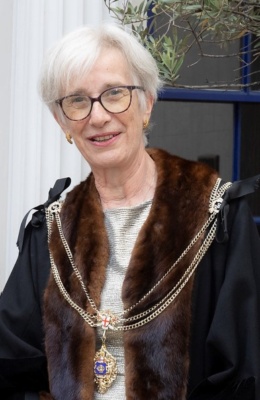
MF: What did it feel like to be the second female Master of the Society?
JA: First and foremost it was an enormous honour to be elected as the 412th Master of the Society in its 404-year history. That there has only been one woman before me (Enid Taylor, Master, 2002 ) reflects the under-representation of women in senior roles within both the Livery and Medicine. It was only in 1983 with the election of Sylvia Tutt as Master, Chartered Secretaries and Administrators that a woman became Master of any livery company. Since then over 4,000 Masters have been elected, of whom about 200 have been women. Things are changing – last year there were 22 Livery Companies with women Masters, including five of the “Great Twelve”. And we have two up- and- coming women on the Court, Dr Julia Neild and Professor Fiona Wilcox.
It has been a particular pleasure to work with Briony Hudson and Christina Dale in their roles as the Presidents of the Society’s Faculties and to have the support of Heather Leake-Date, my chaplain. And no matter if it’s unusual for a woman to be Master, a majority of the staff who so effectively carry out the real, day-to-day work of the Society are women, many of whom I have been privileged to get to know much better during the year.
Although there are large numbers of women in my professional world – in 2020 47% of the 300,000-plus registered medical practitioners in the UK were women and 78% of the NHS workforce is female – women remain under-represented in senior clinical academic and key medico-political roles and the gender pay gap is all too real. These disparities have an impact on the “pipeline” of women ready and willing to take up roles within the Society.
During my year I had been actively involved with a multi-livery initiative exploring equality, diversity, and inclusion across the Livery. I had also been elected to the committee of the Lady Masters Association so intend to keep the female flag flying!
MF: Did you have in mind goals for the year? And what were they?
JA: The goal posts shifted significantly during those years and safely navigating our way through the complexities of Coronavirus and facilitating recovery had been the top priority. Looking for effective ways to support those of our members who were working on the clinical front line had become ever more important during the year.
The challenge to good health posed by urban environments was of special personal interest and also an area that the Society is keen to develop, making it an obvious theme for a year dominated by the health inequalities in London exposed by Covid 19. We have a unique opportunity to bring health in its widest meaning to the attention of City audiences and during 2022 the Society held an inaugural “Apothecary’s Lecture” with a focus on the financial aspects of pandemics. I was also especially delighted that the Society in 2022 partnered with the Medical Women’s Federation on International Women’s Day to explore the safety of women in cities. And by undertaking the Lady Mayoress’s sleep out in Guildhall Yard I was able to draw attention to the many health issues associated with street homelessness.
The interconnectedness of human and planetary health is increasingly recognised as a crucial issue of our generation. Moving towards plant-based diets is an important intervention that is within our power. Working closely with Party Ingredients we designed plant-led, gut microbiome friendly menus for Society hosted events during 2022, highlighting ways to combine delicious meals with better nutrition.
MF: What changes have you seen for women in Leadership roles?
JA: During my career the landscape has been changed by legislation and policies that value and uphold gender equity and equal opportunity. Initiatives such as the Athena SWAN Charter have made a real difference. At the same time there is a far greater recognition of the benefits of a diverse workforce, with increased emphasis on inclusion and representativeness. In today’s interdependent and interconnected world there is a shift in attitude towards a more female leadership style, with greater appreciation of inclusivity, relationship building, collaboration, and compassion. There are more women in leadership roles who can mentor and support others and there are many more male allies whose support for their female colleagues is especially valuable.
MF: Share two top tips for women looking at future roles in this area
JA: Be kind. Tracing the word kindness to its roots goes to the fundamental concept of kin, the notion that we are linked together with responsibilities to one another. It is at its most powerful when, to paraphrase Dr Julian Tudor Hart, “we understand that we humans are all of one species and that we stand or fall together, our very survival depends on helping one another, and where diversity is a strength rather than a weakness”
Be continually curious – keep asking questions and be inquisitive – you will learn new things and have more fun.
MF: What next and how can people connect with you?
JA: I look forward to taking up the much lighter responsibilities of immediate past master, and in the light of my experience to be a better-informed Court Assistant. I remain committed to the work of the Society. In my role as co-chair of London’s HIV Fast Track Cites Initiative, I hope I can further develop my interest in urban health. In 2022 I have met a great many wonderful people across the Livery and the City. We have a flourishing year group, The Platinums, and the social calendar has already taking shape.
To connect my email is janderson@duncanban.com and Twitter is @ProfJAnderson

